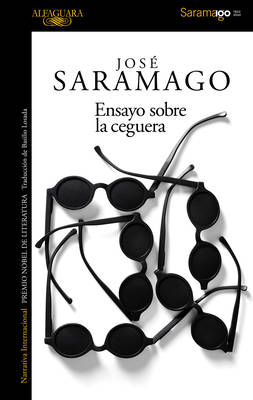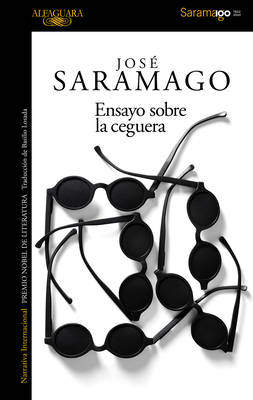
Bedankt voor het vertrouwen het afgelopen jaar! Om jou te bedanken bieden we GRATIS verzending (in België) aan op alles gedurende de hele maand januari.
- Afhalen na 1 uur in een winkel met voorraad
- In januari gratis thuislevering in België
- Ruim aanbod met 7 miljoen producten
Bedankt voor het vertrouwen het afgelopen jaar! Om jou te bedanken bieden we GRATIS verzending (in België) aan op alles gedurende de hele maand januari.
- Afhalen na 1 uur in een winkel met voorraad
- In januari gratis thuislevering in België
- Ruim aanbod met 7 miljoen producten
Zoeken
Omschrijving
Ensayo sobre la ceguera es la ficción de un autor que nos alerta sobre «la responsabilidad de tener ojos cuando otros los perdieron».
«Dentro de nosotros hay algo que no tiene nombre, esa cosa es lo que somos.»
Un hombre parado ante un semáforo en rojo se queda ciego súbitamente. Es el primer caso de una «ceguera blanca» que se expande de manera fulminante. Internados en cuarentena o perdidos en la ciudad, los ciegos tendrán que enfrentarse con lo que existe de más primitivo en la naturaleza humana: la voluntad de sobrevivir a cualquier precio. Ensayo sobre la ceguera es la ficción de un autor que nos alerta sobre «la responsabilidad de tener ojos cuando otros los perdieron». José Saramago traza en este libro una imagen aterradora y conmovedora de los tiempos que estamos viviendo. En un mundo así, ¿cabrá alguna esperanza?
El lector conocerá una experiencia imaginativa única. En un punto donde se cruzan literatura y sabiduría, José Saramago nos obliga a parar, cerrar los ojos y ver. Recuperar la lucidez y rescatar el afecto son dos propuestas fundamentales de una novela que es, también, una reflexión sobre la ética del amor y la solidaridad. ENGLISH DESCRIPTION During the town elections of a nameless city, most of its inhabitants, by their own individual choices, decide to exert their voting rights in an unexpected way. The dirty and sneaky officials in power start making arrangements to eliminate the guilty parties; and if they cannot find any, they will have to make them up. The protagonists of this new novel, a policeman and the woman who was able to maintain her sight in the novel Blindness, are samples of the moral heights that these anonymous citizens are able to reach when they decide to exert their freedom. Saramago, a writer who has become the awakening conscience of a time blinded by the mechanisms of power, sends out an alert: "There may be a day when we will have to ask, Who has signed this in my name?" That day may very well be today.
«Dentro de nosotros hay algo que no tiene nombre, esa cosa es lo que somos.»
Un hombre parado ante un semáforo en rojo se queda ciego súbitamente. Es el primer caso de una «ceguera blanca» que se expande de manera fulminante. Internados en cuarentena o perdidos en la ciudad, los ciegos tendrán que enfrentarse con lo que existe de más primitivo en la naturaleza humana: la voluntad de sobrevivir a cualquier precio. Ensayo sobre la ceguera es la ficción de un autor que nos alerta sobre «la responsabilidad de tener ojos cuando otros los perdieron». José Saramago traza en este libro una imagen aterradora y conmovedora de los tiempos que estamos viviendo. En un mundo así, ¿cabrá alguna esperanza?
El lector conocerá una experiencia imaginativa única. En un punto donde se cruzan literatura y sabiduría, José Saramago nos obliga a parar, cerrar los ojos y ver. Recuperar la lucidez y rescatar el afecto son dos propuestas fundamentales de una novela que es, también, una reflexión sobre la ética del amor y la solidaridad. ENGLISH DESCRIPTION During the town elections of a nameless city, most of its inhabitants, by their own individual choices, decide to exert their voting rights in an unexpected way. The dirty and sneaky officials in power start making arrangements to eliminate the guilty parties; and if they cannot find any, they will have to make them up. The protagonists of this new novel, a policeman and the woman who was able to maintain her sight in the novel Blindness, are samples of the moral heights that these anonymous citizens are able to reach when they decide to exert their freedom. Saramago, a writer who has become the awakening conscience of a time blinded by the mechanisms of power, sends out an alert: "There may be a day when we will have to ask, Who has signed this in my name?" That day may very well be today.
Specificaties
Betrokkenen
- Auteur(s):
- Vertaler(s):
- Uitgeverij:
Inhoud
- Aantal bladzijden:
- 376
- Taal:
- Spaans
Eigenschappen
- Productcode (EAN):
- 9788420460673
- Verschijningsdatum:
- 27/01/2022
- Uitvoering:
- Paperback
- Formaat:
- Trade paperback (VS)
- Afmetingen:
- 1250 mm x 239 mm
- Gewicht:
- 612 g

Alleen bij Standaard Boekhandel
+ 49 punten op je klantenkaart van Standaard Boekhandel
Beoordelingen
We publiceren alleen reviews die voldoen aan de voorwaarden voor reviews. Bekijk onze voorwaarden voor reviews.









